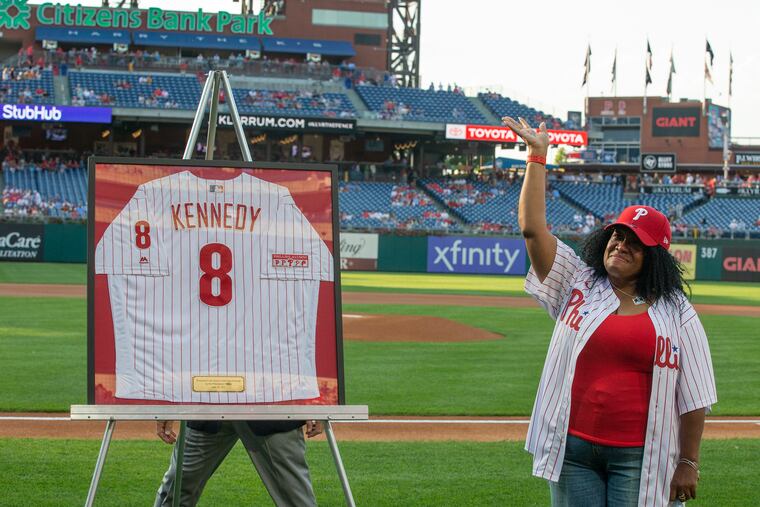Inside the Phillies’ honoring of their first African American player, John Irvin Kennedy
The family of the historic first Black player for the Phillies was present at the ceremony.

At about 5 p.m. Wednesday, Elijah Cooper walked into Suite 72 at Citizens Bank Park and looked for something throwable. He grabbed a pack of Oreos and asked his brother, Joshua, to stand a few feet away from him.
“You know the distance is 60 feet, right?” said his cousin, John. “You going to make it?”
» READ MORE: John Irvin Kennedy dreamed of being the Phillies' Jackie Robinson. He never got the chance.
Elijah nodded. He had been practicing a little bit earlier in the day, in front of the Art Museum. The 11-year-old threw five well-placed pitches to his aunt, all fastballs. In a few hours, he’d be on a big-league mound, throwing the ceremonial first pitch for the Phillies, but he wasn’t nervous. He has his great-grandfather’s natural athleticism.
Elijah had only heard about that athleticism from his grandmother, Tazena. He hadn’t seen it firsthand until Wednesday night. Minutes before game time, he and Tazena stood in the on-deck circle holding hands, as Phillies PA announcer Dan Baker stood at the podium.
“Sixty-five years ago, John Irvin Kennedy became the first African American major league player for the Phillies … fully integrating the National League,” Baker said.
“Kennedy played an integral part in the fabric of Phillies club history. In a time of much adversity, Kennedy displayed tremendous courage, which we proudly honor tonight.”
Baker motioned to the big screen, where a short montage of Kennedy’s career played out in front of their eyes. Baseball historian Rich Westcott, who saw Kennedy play for the Phillies in spring training in 1957, recalled Kennedy’s good fielding and his quick instincts. The narrator of the film, former Phillies outfielder Milt Thompson, not only described Kennedy’s brief major league career, but his Negro Leagues career as well.
Tazena wiped away a tear as she was introduced onto the field. She promised herself she wouldn’t cry, but this was the closest she’d ever come to seeing her father, who died in 1998, in a big-league ballpark. His only season with Phillies came in 1957. He played in just five games with two at-bats. She was born 10 years later.
“I only saw him when he was with the local teams later in his career,” she said. “This was a chance for me to see him in the major leagues. Not actually in action, but this was the next best thing.
“Especially for this little guy to be a part of it,” she added, scratching Elijah’s head.
The 11-year-old was right. He didn’t need much practice. He stepped onto the mound a few minutes later, wearing his great-grandfather’s pinstriped jersey, and a necklace with Kennedy’s photo draped around his neck. He moved a few steps closer to Thompson, who was catching his first pitch. He rocked back and forth, back and forth, back and forth, and then fired a perfect strike, a fastball right down the middle.
“That’s the best first pitch we’ve had all year,” Baker said.
» READ MORE: Phillies to honor John Irvin Kennedy, their first African American player
They walked off the field to rejoin Tazena’s daughters and grandchildren in the suite. Wednesday was a somewhat complicated day for the Kennedy family. Of course, they were thrilled to see their loved one honored in front of thousands of people and to see a display commemorating Kennedy unveiled at the Hall of Fame level in Citizens Bank Park. But they also wished it hadn’t taken 65 years to hear from the organization.
“I just really wish that he was still living to see this because I know that he would have been overwhelmed,” said Tazena’s daughter, Dayan Brown. “But I’m glad that we were able to be here for him. I’m still kind of shocked. All of this time has gone by, and to see this actually come to fruition … it was really exciting. I just really wish he could have seen it, too.”
For decades, Tazena had lost hope that the Phillies would ever honor her father. She was at peace with the fact that she would be the one keeping his legacy alive. And then, in April, she got a call from Rob Holiday, the Phillies’ director of amateur scouting administration. He wanted to celebrate John, and he wanted her family to be there, too.
It was a memorable experience, but she knows her relationship with the Phillies did not end after the final out Wednesday night. Tazena already is thinking ahead. She has talked to Holiday about creating a scholarship fund in her father’s name as a way to grow the game among African American youngsters and make sure that John Irvin Kennedy is never forgotten again.
Whether the Phillies will create a scholarship fund for Kennedy remains to be seen, but from now on, he will forever have a presence in Citizens Bank Park. He won’t be forgotten. And for a daughter who has dedicated her life to remembering her father’s legacy, that’s more than enough.
» READ MORE: John Irvin Kennedy made history on April 22, 1957, becoming the first African American Phillies player